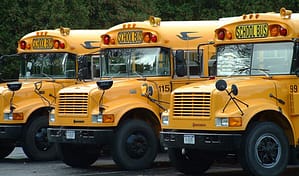 Facing severe budget cuts in today’s tough economy, cutting costs without sacrificing student safety is a formidable task for every school district across the nation. School district transportation managers are responsible for thousands of children each day once they step onto the school bus. Most state laws are very strict when it comes to school buses to ensure the safest operational and driving procedures possible.
Facing severe budget cuts in today’s tough economy, cutting costs without sacrificing student safety is a formidable task for every school district across the nation. School district transportation managers are responsible for thousands of children each day once they step onto the school bus. Most state laws are very strict when it comes to school buses to ensure the safest operational and driving procedures possible.
The Omaha Public School (OPS) District tested a GPS fleet management system on five buses for six weeks in Spring 2010. Transportation manager David Wolfe was impressed with the GPS system and how helpful the information was. The district’s transportation officials are now installing GPS tracking devices on the 264 small buses the district owns and operates. “This is a significant accountability piece,” David Wolfe recently told the school board. He said it would be a good addition for buses that carry students to athletic events or other activities, which often involve travel to less familiar sites outside the district. With fleet GPS systems, transportation managers can answer daily inquiries about vehicle operations: “Where was the bus last Tuesday at 2 p.m.?” and “How fast was the bus going yesterday afternoon on State St.?”
OPS will use the information from the GPS system to monitor a variety of things. It will track how far late buses are from their destinations and pinpoint the location if a bus breaks down. The GPS tracking system will record idle time so routes can be adjusted, reducing time on the road and miles traveled. In addition, the GPS tracking system will record when and how often doors open and how long a bus’s stop arm is used. All of this information will help the school district run efficient routes, saving on fuel and other operating expenses. It will keep drivers accountable to drive both safely and efficiently. It will keep parents informed on where their children are and when they will arrive home. Most importantly, it will keep children safer because their location will be immediately known if a problem ever arises.
School bus managers have many of the same problems as commercial fleet managers. It can be difficult to gather precise information about what route was driven, how long stops took, track where a vehicle is located in real-time and to keep up with vehicle maintenance. With the help of GPS fleet tracking devices, schools and bus companies can now monitor buses from a computer or cell phone ensuring child safety which keeps parents happy and also reduces overhead by being more efficient. GPS enables a transportation manager to improve fleet operations by comparing actual driving paths, stop locations and stop times against planned routes, stops and times. The GPS system will uncover hidden costs that contribute to wasteful spending, such as inefficient bus routes, excessive engine idling, courtesy stops, and underutilized buses.
Fleet tracking systems work like any other GPS tracking system. Each vehicle in the fleet is equipped with a device that communicates with satellites to determine the location and movement of the vehicle. This information can be monitored constantly or checked at regular intervals, depending on the device and software used. It can be real-time or recorded and used for future study. The information collected can be used to keep drivers accountable, calculate costs, and plan more efficient movement of people and goods.